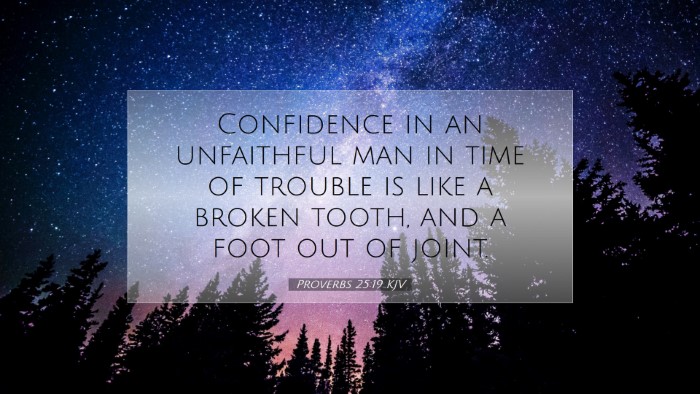Commentary on Proverbs 25:19
Proverbs 25:19 states:
"Confidence in an unfaithful man in time of trouble is like a broken tooth, and a foot out of joint."
This verse provides a profound insight into the nature of trust and the consequences of placing confidence in the untrustworthy. It metaphorically illustrates the pain and dysfunction caused by misplaced faith.
General Overview
The book of Proverbs is filled with practical wisdom that speaks to the lives of individuals, providing guidelines for righteous living. At the heart of this verse is the theme of reliability and the value of faithful relationships. It serves as a warning against trusting those who have proven unworthy of such trust.
Insights from Commentators
Matthew Henry's Commentary
Matthew Henry emphasizes the metaphorical nature of the proverb. He suggests that a broken tooth is a painful reminder of the untrustworthiness that leads to disappointment. Just as a broken tooth cannot serve its purpose, placing confidence in an unfaithful person leads to disastrous outcomes during critical times. Henry considers this a powerful admonition to exercise discernment in choosing whom to trust. He notes that it is unwise to rely on those who have a history of unreliability, especially when one is facing difficulties in life.
Albert Barnes' Notes on the Bible
Albert Barnes relates the illustration in Proverbs 25:19 to the afflictions experienced by a person who relies on an unfaithful individual. He outlines that just as a broken tooth causes dysfunction in eating and a misaligned foot hinders movement, so does an untrustworthy person hinder one’s progress during times of need. Barnes emphasizes that it is crucial to evaluate the character and past behavior of those we choose to rely upon. He encourages believers to seek out and depend on those who have demonstrated fidelity and integrity in their lives.
Adam Clarke's Commentary
Adam Clarke draws attention to the practical implications of this proverb in social settings. He argues that in moments of crisis, trusting in the unreliable can lead to increased suffering and disappointment. Clarke interprets the "broken tooth" as not just physical pain, but also emotional and psychological turmoil caused by betrayal. He underscores the necessity of moral character when it comes to trustworthiness and points out that the societal fabric is woven through dependable relationships. His insights suggest that the wise individual will be prudent in forming alliances and recognizing the value of faithfulness.
Theological Implications
This verse reveals important theological insights regarding human relationships and divine faithfulness. It invites believers to reflect on the nature of God as the ultimate trustworthy source. While human relationships can be fraught with betrayal, God remains constant and faithful. The writer of Proverbs implores us to distinguish between the unfaithful and those who strive to embody the faithfulness of God. This discernment is necessary for spiritual health and stability.
Application for Pastoral Ministry
For pastors and church leaders, Proverbs 25:19 serves as a critical teaching point regarding the nature of trust within the church community. It encourages leaders to foster a culture of faithfulness and integrity. Pastors are challenged to model reliable relationships and to teach their congregations the importance of discernment in alliances, partnerships, and friendships. This proverb also provides a cautionary tale for those who may seek leadership roles without demonstrating reliability and accountability.
Conclusion
Ultimately, Proverbs 25:19 acts as a timeless reminder of the need for wise discernment in placing confidence in others. It speaks volumes about the necessity of living with integrity and the consequences of unfaithfulness. As believers, we are called to reflect on our relationships, ensuring they align with the values of trust and dependence on the faithful character of God.


